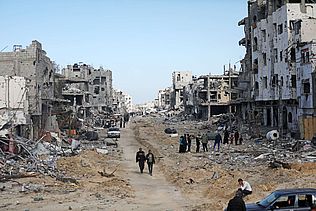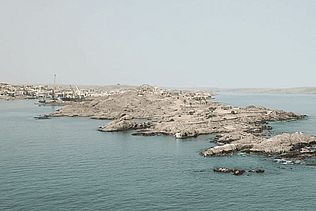medico international has been working with partner organisations in Israel and Palestine for decades. In this long period of co-operation, mostly partnerships with political minorities in the respective context, we have tried many things. A lot has failed or was half successful. We have always been on the side of the oppressed and at the same time on the side of the idea of mutual understanding and the search for a non-nationalist perspective.
In spite the experience of political violence and our getting used to setbacks and defeats, which is first and foremost the reality of our partners, everything that has happened since 7 October calls into question conventional strategies and certainties. We hear horror stories of death, violence and despair that are almost unbearable, even though we are not the ones who are forced to go through them ourselves.
Today, we continue to stand by our partners in Israel and Palestine as best we can, as far as this is possible. And possibilities are very limited. Because they are desperate, at the end of their tether and sad to death. They are surrounded by fear and death. They do not sleep, have no electricity and the world around them is exploding every day. They, and we with them, try not to bow to the prevailing logic of war and the false dichotomies. But that does not mean that we are impartial, on the contrary.
And that is why we are speaking now and today about Gaza, which is talked about all the time and yet over which there hangs an unbearable silence. And we speak with urgency, because the horror of Gaza is happening now. It is not an event of the past, it is ongoing. And it has to stop. Immediately.
Almost all the arguments that might have been or sounded convincing two, three or four weeks ago are no longer convincing today. Israel's army is out of control, acting disproportionally and outside the bounds of international humanitarian law and values. The people of Gaza have been living through sheer hell for weeks and no tunnel beneath them justifies the continuation of this nightmare. Since 7 October there have been widespread attacks on all areas of Gaza, which have damaged or destroyed around half of all homes or rendered them uninhabitable for the time being. 1.5 million people are on the run, more than ever before in Palestine. There are no safe havens, bombing is taking place everywhere. Entire families are being obliterated by air raids.
The preliminary result: within four weeks, more than twice as many women and children have fallen victim to the war in Gaza as have died in Ukraine as a result of crimes committed by the Russian army since the start of the war there. Almost 11,000 people have been killed in Israeli attacks, around 68 per cent of them women and children. An estimated 2,650 are missing, including around 1,400 children. Most of them are probably buried under the rubble of their homes. In no other conflict in the world has the United Nations lost as many staff as in Gaza: 100 of their colleagues have been killed in the attacks since 7 October.
Even before the devastating attack on Israel by Hamas and other armed Palestinian groups, around 80 per cent of the people in Gaza were dependent on humanitarian aid. 65 per cent of the population suffered from food insecurity, and high unemployment had pushed two thirds below the poverty line. The population, around half of whom are children and youth, had no prospects already before the full military siege began.
On 9 October, Israel's defence minister ordered the electricity and water supply to be cut off and all deliveries of goods, including food, medicine and fuel, to be stopped. Prior to this, an average of 500 lorries came into Gaza every day. That is what is needed to supply the area. As a "humanitarian gesture", the Israeli government allowed a total of 650 trucks into Gaza until 7 November. In its latest report, the UN Conference on Trade and Development (UNCTAD) concludes: "Border closures and repeated military operations have set in motion a vicious cycle of economic and institutional collapse that has rendered Gaza a case of 'development in reverse'."
The current war has a catastrophic impact on the coverage of even the people’s most basic needs. According to the WHO, 14 clinics have had to shut down. The staff at the remaining hospitals have to fear for their patients’ lives. Without electricity, autoclaves, incubators, dialysers and other vital equipment cannot function. The supply of fuel for the hospitals' emergency generators is essential for survival and continues to be blocked by Israel. Medicines, painkillers, anaesthetics, antibiotics, wound dressings and disinfectants are no longer available in sufficient quantities.
Ensuring compliance with international law
Apparently, the debates in Germany in recent weeks have led many to believe that Israel's army must be unconditionally supported and that it is a trustworthy force for good. This belief still seems to be stronger than the facts on the ground and testimonies from there, which, with all due caution towards the available sources, draw a clear picture of undeniable horror.
But Germany is not just conducting a debate. The German government is a political actor and bears responsibility. Chancellor Scholz was the first head of government to visit Israel after 7 October, the German government and all parties in Germany declared their solidarity with Israel – which in this situation also means solidarity with the war against Gaza – and the German government has issued a free pass for this, which supposed to be morally derived from the bloody raid of 7 October.
There is no doubt that Hamas and other armed Palestinian groups are guilty of serious war crimes and crimes against humanity and must be held accountable. They continue to indiscriminately fire rockets at targets in Israel and hold civilians hostage. However, these crimes do not absolve Israel of its own responsibility under international humanitarian law. The complete and indiscriminate sealing off of the entire coastal enclave and the extensive denial of humanitarian aid holds the entire Palestinian civilian population of Gaza collectively accountable for the crimes of those groups. Targeted attacks on non-military infrastructure and the civilian population are war crimes. Experts now believe that the severity and lack of distinction in Israel's actions are not covered by international humanitarian law. There are accusations of serious crimes that have already been committed, including crimes against humanity, while there are urgent warnings against further offences.
As quickly as possible, an end must be put to actions that violate international law. In order to fulfil its own responsibility under international law to prevent war crimes and crimes against humanity, the German government, together with other states, must urgently exert appropriate pressure on the warring parties. It should continue to support the important work of the International Criminal Court and offer the Chief Prosecutor all necessary assistance to prevent further mass atrocities and bring to justice those suspected of involvement in crimes under the Rome Statute or responsibility for such.
A political horizon is necessary. It is time to develop a political perspective with the people between the Mediterranean and the Jordan River. This is the only way to create security beyond military force. There will either be rights and security for everyone, or for no one.
medico international on November 10, 2023.



